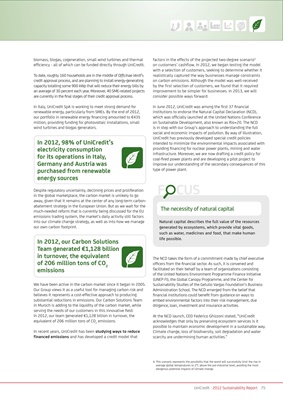
biomass, biogas, cogeneration, small wind turbines and thermal factors in the effects of the projected two-degree scenario4
efficiency - all of which can be funded directly through UniCredit. on customers’ cashflow. In 2012, we began testing the model
with a selection of customers, seeking to determine whether it
To date, roughly 160 households are in the middle of Officinae Verdi’s realistically captured the way businesses manage constraints
credit approval process, and are planning to install energy-generating on carbon emissions. Although the model was well-received
capacity totalling some 900 kWp that will reduce their energy bills by by the first selection of customers, we found that it required
an average of 30 percent each year. Moreover, 40 SME-related projects improvement to be simpler for businesses. In 2013, we will
are currently in the final stages of their credit approval process. consider possible ways forward.
In Italy, UniCredit SpA is working to meet strong demand for In June 2012, UniCredit was among the first 37 financial
renewable energy, particularly from SMEs. By the end of 2012, institutions to endorse the Natural Capital Declaration (NCD),
our portfolio in renewable energy financing amounted to €435 which was officially launched at the United Nations Conference
million, providing funding for photovoltaic installations, small on Sustainable Development, also known as Rio+20. The NCD
wind turbines and biogas generators. is in step with our Group’s approach to understanding the full
social and economic impacts of pollution. By way of illustration,
UniCredit has previously developed special credit policies
In 2012, 98% of UniCredit’s intended to minimize the environmental impacts associated with
electricity consumption providing financing for nuclear power plants, mining and water
infrastructure. Moreover, we are now drafting a credit policy for
for its operations in Italy, coal-fired power plants and are developing a pilot project to
Germany and Austria was improve our understanding of the secondary consequences of this
purchased from renewable type of power plant.
energy sources
Despite regulatory uncertainty, declining prices and proliferation
in the global marketplace, the carbon market is unlikely to go
F CUS
away, given that it remains at the center of any long-term carbon-
abatement strategy in the European Union. But as we wait for the
much-needed reform that is currently being discussed for the EU The necessity of natural capital
emissions trading system, the market’s daily activity still factors
into our climate change strategy, as well as into how we manage Natural capital describes the full value of the resources
our own carbon footprint. generated by ecosystems, which provide vital goods,
such as water, medicines and food, that make human
life possible.
In 2012, our Carbon Solutions
Team generated €1,128 billion
in turnover, the equivalent The NCD takes the form of a commitment made by chief executive
of 206 million tons of CO2 officers from the financial sector. As such, it is convened and
emissions facilitated on their behalf by a team of organizations consisting
of the United Nations Environment Programme Finance Initiative
(UNEP FI), the Global Canopy Programme, and the Center for
We have been active in the carbon market since it began in 2005. Sustainability Studies of the Getulio Vargas Foundation’s Business
Our Group views it as a useful tool for managing carbon risk and Administration School. The NCD emerged from the belief that
believes it represents a cost-effective approach to producing financial institutions could benefit from guidance on ways to
substantial reductions in emissions. Our Carbon Solutions Team embed environmental factors into their risk management, due
in Munich is adding to the liquidity of the carbon market, while diligence, loan, investment and insurance activities.
serving the needs of our customers in this innovative field.
In 2012, our team generated €1,128 billion in turnover, the At the NCD launch, CEO Federico Ghizzoni stated, “UniCredit
equivalent of 206 million tons of CO2 emissions. acknowledges that only by preserving ecosystem services is it
possible to maintain economic development in a sustainable way.
In recent years, UniCredit has been studying ways to reduce Climate change, loss of biodiversity, soil degradation and water
financed emissions and has developed a credit model that scarcity are undermining human activities.”
4. This scenario represents the possibility that the world will successfully limit the rise in
average global temperatures to 2°C above the pre-industrial level, avoiding the most
dangerous potential impacts of climate change.
UniCredit · 2012 Sustainability Report 75